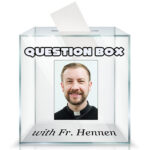By Fr. Thom Hennen
Question Box
Q: Can you explain the understanding of salvation from canon 9 in the Council of Trent?

A: If I had a nickel for every time someone asked me this, I would have 5 cents. For starters, what is the Council of Trent? It is one of 21 “ecumenical councils” in the Catholic Church, in which the bishops of the world (the successors of the Apostles) gathered to discuss matters of faith. The result of each of these councils was the formal affirmation, clarification or further definition of some aspect of the Christian faith.
The first ecumenical council was the Council of Nicaea, held in 325 to address the heresy of Arianism and what we believe about the divine and human natures of Christ. The most recent ecumenical council was the Second Vatican Council (1962-1965). Prior to Vatican II, ecumenical councils were more about doctrine, less about pastoral practice. Vatican II was called specifically as a “pastoral council.” While the council documents are loaded with doctrine, the primary concern was how we live and apply what we believe in a rapidly changing world.
Canon 9 from the Council of Trent (convened over multiple sessions between 1545 and 1563) states: “If anyone says that the sinner is justified by faith alone, meaning that nothing else is required to cooperate in order to obtain the grace of justification, and that it is not in any way necessary that he be prepared and disposed by the action of his own will, let him be anathema [excommunicated].”
We need to remember that the Council of Trent was convened to address the Protestant Reformation, which had a huge impact on the Church in Western Europe. The rallying cry of Martin Luther (a former Augustinian monk) was sola fide, meaning “faith alone.” Luther and other reformers held that one was justified (made right with God) by an interior act of faith alone and not by a person’s good works or moral choices.
We should also remember that the Protestant reformers were reacting to abuses within the Church and an attitude that had crept in that you could earn (or “buy”) your way to heaven. To be perfectly clear, this was not and is not an accurate understanding of Catholic soteriology (theology of salvation). Much of what we thought we disagreed on has in part been reconciled, for example in the 1999 Joint Declaration on the Doctrine of Justification, which was the product of Catholic and Lutheran dialogue. While not accepted by all, this document states that we are justified “by grace through faith.” Also, faith means something more than mere intellectual assent. As the Apostle James wrote in his letter, “Faith without works is dead” (see James 2:14-26).
Back to Canon 9: basically, it is stating that we do not believe that by faith “alone” we are restored to right relationship with God. How we act on that faith, how we live that faith matters. We can accept Jesus one moment and deny him the next, by word, thought or action. We absolutely believe that we have all been redeemed (“bought back” or ransomed) by the precious blood of Jesus, who died for our sins and truly rose from the dead. We also believe that we are immersed in this saving mystery by our baptism. And yet, we are not stripped of our free will. We can still reject this gift. To be “saved,” therefore means to accept this gift not just once, but in some sense daily, in our concrete choices and cooperation with the gift of God’s grace.
(Father Thom Hennen serves as the pastor of Sacred Heart Cathedral in Davenport. Send questions to messenger@davenportdiocese.org)










